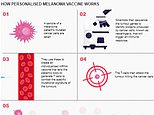A skin cancer vaccine being tested by the NHS can halve the risk of dying or the disease coming back, new results show.
In the longest study of the treatment yet, melanoma patients who received the personalized vaccine along with the immunotherapy drug Keytruda were half as likely to be alive three years later.
The risk of the cancer coming back and dying was reduced by 49 percent compared to patients taking Keytruda alone, which is the current standard of care.
Experts said they “fully expect” similarly impressive results in cancer vaccine trials in other types of cancer, including breast and bowel cancer.
Developed by pharmaceutical giants Moderna and MSD, the vaccine is custom-designed for people using the specific genetic makeup of their tumor, giving it the best chance of a cure.
Injected into patients after they have undergone surgery, it works by telling the body to look for cancer cells and prevent the deadly disease from returning.
The trial involved 157 patients with stage 3 or 4 of the deadliest type of skin cancer, and the findings were presented at the American Society of Clinical Oncology (ASCO) conference in Chicago.
Three-quarters (75 percent) of those who had received the vaccine plus Keytruda were cancer-free after 2.5 years, compared to 56 percent who received standard treatment alone.
It comes as University College London Hospitals NHS Foundation Trust (UCLH) leads final phase trials of the therapy, which scientists hope can also be used to stop lung, bladder and kidney cancer.
Iain Foulkes, executive director of research and innovation at Cancer Research UK, said the findings add to the “exciting and developing landscape of cancer vaccine research”.
He said: ‘The results show positive signs of the long-lasting efficacy of the mRNA vaccine.
“After three years of follow-up, the data suggest that levels of cancer relapse did not increase in people with high-risk advanced-stage melanoma.
‘The findings highlight the great promise of therapeutic cancer vaccines used in combination with potent immunotherapies.
“Similar vaccine technologies are also being investigated in trials in the UK for use in colorectal cancer after surgery.”
The combination treatment is not yet routinely available on the NHS, outside of clinical trials.
But in April, Stéphane Bancel, CEO of Moderna, said he believed an mRNA vaccine against melanoma could be available in 2025.
The global UCLH phase three trial will include a wider range of patients and researchers hope to recruit around 1,100 people.
At least 60 to 70 patients will be recruited across eight UK centers including London, Manchester, Edinburgh and Leeds.
A second trial presented at the Chicago conference found that cancer vaccines can significantly improve the survival of breast cancer patients after surgery.
Led by a team at the University of Vienna and involving 400 patients with early-stage breast cancer, the vaccine (tecemotide) increased the chances of survival by 16 percent, compared to those who received standard care.
Use of the drug, used to boost the immune system before surgery, left 81 percent of patients alive seven years later, compared to 65 percent taking existing drugs.
Lead author Dr. Christian Singer said the vaccine “markedly improved distant recurrence-free survival and overall survival.”
He added: “This is the first significant and profound long-term survival benefit of a cancer vaccine in breast cancer patients reported to date.”


